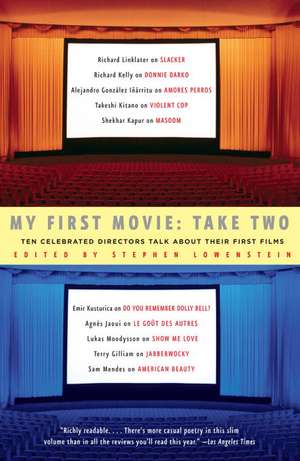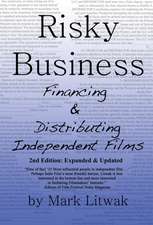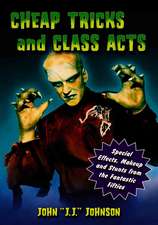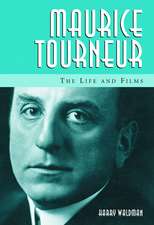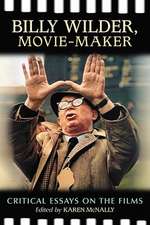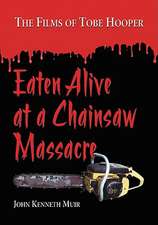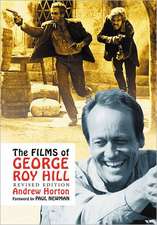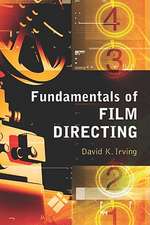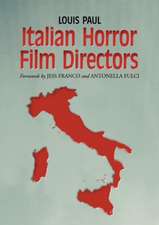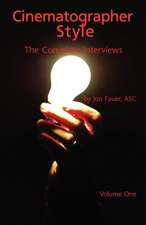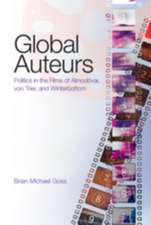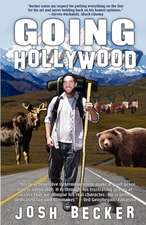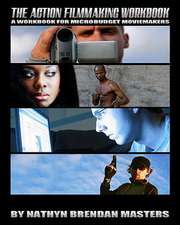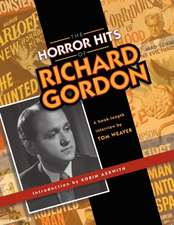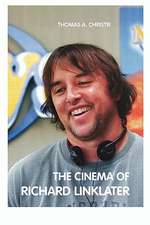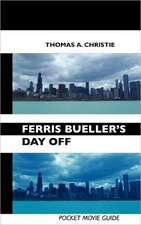My First Movie, Take Two: Ten Celebrated Directors Talk about Their First Film
Autor Stephen Lowensteinen Limba Engleză Paperback – 31 dec 2008
Preț: 116.64 lei
Nou
Puncte Express: 175
Preț estimativ în valută:
22.32€ • 23.27$ • 18.55£
22.32€ • 23.27$ • 18.55£
Carte disponibilă
Livrare economică 28 februarie-14 martie
Preluare comenzi: 021 569.72.76
Specificații
ISBN-13: 9781400079902
ISBN-10: 140007990X
Pagini: 318
Ilustrații: 16 PP B&W
Dimensiuni: 132 x 203 x 18 mm
Greutate: 0.34 kg
Editura: Vintage Publishing
ISBN-10: 140007990X
Pagini: 318
Ilustrații: 16 PP B&W
Dimensiuni: 132 x 203 x 18 mm
Greutate: 0.34 kg
Editura: Vintage Publishing
Notă biografică
Stephen Lowenstein is the author of My First Movie. He has worked on British television documentaries for Channel 4, ITV, and the BBC. He is the writer/director of two critically acclaimed short films and currently has several feature-length projects in development in England and America. He lives in London.
Extras
chapter 1
Richard Linklater
SLACKER
Can you say a little about your upbringing?
I was born in Houston and lived there my first ten years. My parents divorced when I was seven, and eventually my mother got a teaching job in Huntsville, Texas, which is about seventy miles northeast of Houston. So I moved there when I’d just turned ten. And that was quite different from Houston. When you live in a big city there’s a lot going on, art museums, the zoo, pro sports teams, and so on. And then we moved to this pretty small town, eighteen thousand people, and there was a university and the state prison there. We were always moving around. Even in that town we moved every year. My mom was struggling, I guess. So I think I had a semirural Texas upbringing— because this was a small town with a lot of ranchers and a church on every corner, a really small, conservative town. But on the weekends I’d go and visit my father in Houston and go to movies and art museums. So I had this small town/big town upbringing. I’m thankful for this because I would see a movie in Houston and I would go back and tell my friends about it in Huntsville. And then it would show up in Huntsville six weeks later. So I was always ahead of the curve, culturally speaking. On the other hand, I only left Texas once before I was twenty!
Were movies already something you were interested in as a kid?
No, no. Movies were very far away. They were just magical things you went and saw. I liked every movie I saw up to a certain age. I just liked movies. I still do. But the thought that you could make a movie— I can’t explain how far that was from my thinking. The idea that I could ever make a movie never entered my mind until college. Now kids are very aware of the process. But then, movies just showed up. Oh, here’s the cowboy movie! Every week it was a new movie. They were just social things we’d go to. But I was a writer from an early age. I was the fifth-grader writing the story that the teacher would read aloud to the class. In sixth grade we did a production of Julius Caesar and I ended up a kind of co-director to the teacher. I naturally took a lead role. So I think I had a feel for it. I wrote a play in junior high that got performed for the faculty. Looking back, some of it makes sense, but I didn’t really think about it much at the time. I was probably most interested in sports. It wasn’t until college that I started to take a couple of theater classes and started to think about film. That’s a huge jump, though. I just went from junior high to college.
Can you say a little about your high school years?
I had a pretty mediocre education, although I had an influential English teacher in my third year of high school. I was in this advanced class—which I wasn’t really qualified to be in, as I didn’t have particularly good grades—but the teacher before had recommended me because I’d written something she liked. We wrote a lot, and our teacher actually showed us Battleship Potemkin and we had to analyze it. So I started thinking about film a little bit. In my senior year I remember four of us wandered into a midnight screening of Eraserhead. The three people I was with were ready to go about twenty minutes in. They were like, “What the fuck is this?” I was like, “I’m not going anywhere.” Maybe I couldn’t explain what I was watching, but I couldn’t take my eyes off it. But in general I didn’t have many serious thoughts in my head at that time. I was just being a kid. I’m amazed at how shallow I was at that age. I read now what other people were doing at certain ages and I’m really envious at how advanced they were and what great educations they received. I was just the opposite. I was a jock, chasing girls and just doing the dumbest shit! [Big laugh.] I mean, I had these sparks and inklings. I had this vague notion I wanted to be a writer someday. But I was not taking anything seriously. I was just trying to have a good time. I had been through some existential teenage crisis, depressing myself. By the end of high school I was just consciously putting that away and saying, “I’m just going to have a good time.” I was afraid I was going to drive myself crazy by thinking too much so I consciously wasn’t thinking for a couple of years there. That all changed in college again. It swarms back over you.
What happened after high school?
Luckily I received a baseball scholarship, because I’m not sure I would have been able to afford college otherwise.
What were you going to study there?
I didn’t really know. I was just drifting. I found myself taking a lot of English classes. I had a creative writing teacher who’d written novels and books of poetry and I enjoyed being around a bunch of people with writing ambitions. I also took a playwriting class that had a big impact on me. I never got around to taking all the requirements, all the biology and the things you have to take to get a degree. I was just taking classes that interested me. At some point I realized I was probably never going to graduate. I would have to take all these classes I wasn’t interested in. I was always a bad student in that way. I couldn’t stomach things I wasn’t interested in. I couldn’t be a good soldier and just get through it. Hence I was a pretty mediocre student, but what I liked, I liked a lot. This was the early eighties, and the VCR had just shown up, so once a week we’d watch a movie in the English department. You know, A Clockwork Orange, Chinatown, or something, and a teacher would lecture on it. Every English professor is also a film critic, a film thinker, right? So that was really interesting, thinking about movies. But what I was really into more than anything was theater. You know, studying playwrights, reading a lot of plays, writing a couple of plays. I had dialogue in my head. I remember hearing that Sam Shepard had gone to New York, worked as a busboy, and written for off-Broadway. And that just sounded cool. I was like, “I want to go to New York and write plays.” I was starting to have these romantic, artistic notions.
So what did you actually do?
Reality has a way of crashing down on you. I had this heart problem that prevented me from being able to run, which meant I couldn’t play baseball any longer. I legally could have kept my scholarship, but I thought I didn’t want to be in school and not be playing baseball. In the U.S. we’re all deluded into thinking like, “Oh, the world is open, you can be anything.” It was around this time I was starting to realize I was kind of a nobody from nowhere. The George Bushes of the world go to Andover and Yale. The class division in our culture was becoming really apparent to me. When you don’t have anything given to you and you don’t have money or anything, you’re like, “Okay, I’m going to have to find my own way through this, nobody is going to help me.” The path wasn’t laid out for me at all, especially with what I wanted to do, which was to write, be creative. The thought of having a real job was super-depressing. I would have been content to just live in a little closet and read all day and live on welfare. That would have been fine with me. I guess I knew what I didn’t want in life—that was very clear—but I was still reaching for what I did want. So I lucked into this summer job working on an offshore oil rig. I was making a lot of money for someone who’d only had a lot of crappy jobs that paid minimum wage. For the first time I was making enough money to save, you know, a hundred and thirty dollars a day, which is a lot when you’re used to making twenty dollars a day. I was living with my parents in Houston, my dad and my stepmother. I just had a room there and I was working all the time. So I thought, “Okay, I’m young, I have no idea what I want to do but at least I can save some money and buy some freedom once I know what I want to do.” Looking back, I’m amazed I had the discipline to say, “Okay, I’m not going to get anything accomplished in the next few years anyway, so I might as well set myself up for the future.” All I really wanted to do was read and watch movies.
What did your parents think about this?
I don’t know. I guess they liked the thought of me being responsible. And at least I wasn’t hitting them up for money.
You were improving yourself?
Yeah. I was still reading a lot. But I think no one had any idea where it was leading. I think there was a hope in my family that I would get back into school. Although we had no money, everyone got their college degree and did okay. So I was the least educated, and for a while there—for my entire twenties, actually!—I didn’t have much to show for myself. I just saved up a lot of money and read when I was offshore. And when I wasn’t working, that’s when the movie thing kicked in. This was the early eighties and there were still repertory and art cinemas in Houston. There was the River Oaks, the Rice Media Center, and the Greenway Plaza showing all the classics and the latest art-house releases. So I just found myself at movies. I’d see most of the mainstream movies that were out, but then also everything else I could find. I’d go home and read up on a particular director or actor I’d seen, or a book on the French New Wave or some other segment of film history. At some point I realized I wasn’t thinking about theater any more—it was all cinema all the time.
This was the beginning of your celebrated five years of three movies a day?
Yeah! All I really wanted to do was watch movies and read. Actually, I think that’s pretty much all I still want to do. [Laughs.] Anyway, somewhere in the two and a half years I was working offshore, I bought a book called something like The Technical Elements of Filmmaking, but it just sat there looming on the shelf for a long time. I knew I’d eventually pick it up, but I had read this Alfred Hitchcock quote in relation to film schools. He thought young people should see a lot of movies and learn as much as they could before they started making them. That kind of made sense to me, on a systematic level. I was certainly aware of the many film schools out there, and I knew there were kids my age, twenty-one or twenty-two, who were in school making films. I’d seen some shorts that had been made in and around the University of Texas in Austin. There had been a special program of them in Houston, and it made me think maybe Austin was the place to be. I was thinking I could move there and maybe eventually get into the film school. I also flirted with the idea of UCLA. My uncle lived in Southern California so I went out there and looked around a little. But then I realized I couldn’t get in because my grades weren’t good enough. Then I found out my grades weren’t good enough to get into the University of Texas, either. So I was thinking, “Oh wow, no one wants me.” But it was kind of good because at my core I’m pretty anti-institutional. Once in Austin I got to know some people who were in film school and I’d sit in on various classes. Often I’d hear the teacher and think, “You know what? There’s a reason I never liked the academic world.” I just thought my path would be on my own. I’ll learn from everybody, but I don’t think it’s in my cards to be accredited. So by the time I finally moved to Austin I’d already bought a camera, some editing equipment, and a bunch of film stock and started shooting film. I remember thinking, “This is it, this is what I’m going to do—no turning back.” I was never worried about the technical aspects of filmmaking because I was always good with that kind of stuff—it’s not that tough if you have a knack for it in the first place. The guy Stanley Kubrick rented his camera from taught him how to load it on the day he was shooting his first film. And I’m a believer in the Stanley Kubrick school of filmmaking! I’ve never understood people who are like, “I’m going to spend all this money and go through all this academic rigmarole so I can my lay my hands on a camera.” Just rent a camera or borrow a camera so you can use it all weekend. The technical apparatus of filmmaking is not that big a deal; it’s not that intimidating. Nowadays everybody owns their own digital cameras, so it’s almost not even an issue.
I read that you took some classes at the Austin Community College?
Yeah, at that time I hadn’t totally dumped the idea of going to film school, I guess, and to give myself a few options, I had to get my grades up by taking a few classes. It turned out to be the best thing I ever did. I took a film history and a film appreciation class in the same semester, thinking it would be easy and fun. It turned out I had to write about twenty-five papers, which was a bit grueling but exhilarating. Until then all my film studies had been on my own. I had seen all these movies alone. I was reading alone. I was living alone. Now I had to articulate my ideas on various films and different aspects of filmmaking and film history. If the assignment were to write a four-page paper on Citizen Kane or something, I’d write a twelve-page paper. If you had to write two pages on Brando in Last Tango in Paris, I’d write six. I was like, “Wow, too many ideas, too much to express!”
Richard Linklater
SLACKER
Can you say a little about your upbringing?
I was born in Houston and lived there my first ten years. My parents divorced when I was seven, and eventually my mother got a teaching job in Huntsville, Texas, which is about seventy miles northeast of Houston. So I moved there when I’d just turned ten. And that was quite different from Houston. When you live in a big city there’s a lot going on, art museums, the zoo, pro sports teams, and so on. And then we moved to this pretty small town, eighteen thousand people, and there was a university and the state prison there. We were always moving around. Even in that town we moved every year. My mom was struggling, I guess. So I think I had a semirural Texas upbringing— because this was a small town with a lot of ranchers and a church on every corner, a really small, conservative town. But on the weekends I’d go and visit my father in Houston and go to movies and art museums. So I had this small town/big town upbringing. I’m thankful for this because I would see a movie in Houston and I would go back and tell my friends about it in Huntsville. And then it would show up in Huntsville six weeks later. So I was always ahead of the curve, culturally speaking. On the other hand, I only left Texas once before I was twenty!
Were movies already something you were interested in as a kid?
No, no. Movies were very far away. They were just magical things you went and saw. I liked every movie I saw up to a certain age. I just liked movies. I still do. But the thought that you could make a movie— I can’t explain how far that was from my thinking. The idea that I could ever make a movie never entered my mind until college. Now kids are very aware of the process. But then, movies just showed up. Oh, here’s the cowboy movie! Every week it was a new movie. They were just social things we’d go to. But I was a writer from an early age. I was the fifth-grader writing the story that the teacher would read aloud to the class. In sixth grade we did a production of Julius Caesar and I ended up a kind of co-director to the teacher. I naturally took a lead role. So I think I had a feel for it. I wrote a play in junior high that got performed for the faculty. Looking back, some of it makes sense, but I didn’t really think about it much at the time. I was probably most interested in sports. It wasn’t until college that I started to take a couple of theater classes and started to think about film. That’s a huge jump, though. I just went from junior high to college.
Can you say a little about your high school years?
I had a pretty mediocre education, although I had an influential English teacher in my third year of high school. I was in this advanced class—which I wasn’t really qualified to be in, as I didn’t have particularly good grades—but the teacher before had recommended me because I’d written something she liked. We wrote a lot, and our teacher actually showed us Battleship Potemkin and we had to analyze it. So I started thinking about film a little bit. In my senior year I remember four of us wandered into a midnight screening of Eraserhead. The three people I was with were ready to go about twenty minutes in. They were like, “What the fuck is this?” I was like, “I’m not going anywhere.” Maybe I couldn’t explain what I was watching, but I couldn’t take my eyes off it. But in general I didn’t have many serious thoughts in my head at that time. I was just being a kid. I’m amazed at how shallow I was at that age. I read now what other people were doing at certain ages and I’m really envious at how advanced they were and what great educations they received. I was just the opposite. I was a jock, chasing girls and just doing the dumbest shit! [Big laugh.] I mean, I had these sparks and inklings. I had this vague notion I wanted to be a writer someday. But I was not taking anything seriously. I was just trying to have a good time. I had been through some existential teenage crisis, depressing myself. By the end of high school I was just consciously putting that away and saying, “I’m just going to have a good time.” I was afraid I was going to drive myself crazy by thinking too much so I consciously wasn’t thinking for a couple of years there. That all changed in college again. It swarms back over you.
What happened after high school?
Luckily I received a baseball scholarship, because I’m not sure I would have been able to afford college otherwise.
What were you going to study there?
I didn’t really know. I was just drifting. I found myself taking a lot of English classes. I had a creative writing teacher who’d written novels and books of poetry and I enjoyed being around a bunch of people with writing ambitions. I also took a playwriting class that had a big impact on me. I never got around to taking all the requirements, all the biology and the things you have to take to get a degree. I was just taking classes that interested me. At some point I realized I was probably never going to graduate. I would have to take all these classes I wasn’t interested in. I was always a bad student in that way. I couldn’t stomach things I wasn’t interested in. I couldn’t be a good soldier and just get through it. Hence I was a pretty mediocre student, but what I liked, I liked a lot. This was the early eighties, and the VCR had just shown up, so once a week we’d watch a movie in the English department. You know, A Clockwork Orange, Chinatown, or something, and a teacher would lecture on it. Every English professor is also a film critic, a film thinker, right? So that was really interesting, thinking about movies. But what I was really into more than anything was theater. You know, studying playwrights, reading a lot of plays, writing a couple of plays. I had dialogue in my head. I remember hearing that Sam Shepard had gone to New York, worked as a busboy, and written for off-Broadway. And that just sounded cool. I was like, “I want to go to New York and write plays.” I was starting to have these romantic, artistic notions.
So what did you actually do?
Reality has a way of crashing down on you. I had this heart problem that prevented me from being able to run, which meant I couldn’t play baseball any longer. I legally could have kept my scholarship, but I thought I didn’t want to be in school and not be playing baseball. In the U.S. we’re all deluded into thinking like, “Oh, the world is open, you can be anything.” It was around this time I was starting to realize I was kind of a nobody from nowhere. The George Bushes of the world go to Andover and Yale. The class division in our culture was becoming really apparent to me. When you don’t have anything given to you and you don’t have money or anything, you’re like, “Okay, I’m going to have to find my own way through this, nobody is going to help me.” The path wasn’t laid out for me at all, especially with what I wanted to do, which was to write, be creative. The thought of having a real job was super-depressing. I would have been content to just live in a little closet and read all day and live on welfare. That would have been fine with me. I guess I knew what I didn’t want in life—that was very clear—but I was still reaching for what I did want. So I lucked into this summer job working on an offshore oil rig. I was making a lot of money for someone who’d only had a lot of crappy jobs that paid minimum wage. For the first time I was making enough money to save, you know, a hundred and thirty dollars a day, which is a lot when you’re used to making twenty dollars a day. I was living with my parents in Houston, my dad and my stepmother. I just had a room there and I was working all the time. So I thought, “Okay, I’m young, I have no idea what I want to do but at least I can save some money and buy some freedom once I know what I want to do.” Looking back, I’m amazed I had the discipline to say, “Okay, I’m not going to get anything accomplished in the next few years anyway, so I might as well set myself up for the future.” All I really wanted to do was read and watch movies.
What did your parents think about this?
I don’t know. I guess they liked the thought of me being responsible. And at least I wasn’t hitting them up for money.
You were improving yourself?
Yeah. I was still reading a lot. But I think no one had any idea where it was leading. I think there was a hope in my family that I would get back into school. Although we had no money, everyone got their college degree and did okay. So I was the least educated, and for a while there—for my entire twenties, actually!—I didn’t have much to show for myself. I just saved up a lot of money and read when I was offshore. And when I wasn’t working, that’s when the movie thing kicked in. This was the early eighties and there were still repertory and art cinemas in Houston. There was the River Oaks, the Rice Media Center, and the Greenway Plaza showing all the classics and the latest art-house releases. So I just found myself at movies. I’d see most of the mainstream movies that were out, but then also everything else I could find. I’d go home and read up on a particular director or actor I’d seen, or a book on the French New Wave or some other segment of film history. At some point I realized I wasn’t thinking about theater any more—it was all cinema all the time.
This was the beginning of your celebrated five years of three movies a day?
Yeah! All I really wanted to do was watch movies and read. Actually, I think that’s pretty much all I still want to do. [Laughs.] Anyway, somewhere in the two and a half years I was working offshore, I bought a book called something like The Technical Elements of Filmmaking, but it just sat there looming on the shelf for a long time. I knew I’d eventually pick it up, but I had read this Alfred Hitchcock quote in relation to film schools. He thought young people should see a lot of movies and learn as much as they could before they started making them. That kind of made sense to me, on a systematic level. I was certainly aware of the many film schools out there, and I knew there were kids my age, twenty-one or twenty-two, who were in school making films. I’d seen some shorts that had been made in and around the University of Texas in Austin. There had been a special program of them in Houston, and it made me think maybe Austin was the place to be. I was thinking I could move there and maybe eventually get into the film school. I also flirted with the idea of UCLA. My uncle lived in Southern California so I went out there and looked around a little. But then I realized I couldn’t get in because my grades weren’t good enough. Then I found out my grades weren’t good enough to get into the University of Texas, either. So I was thinking, “Oh wow, no one wants me.” But it was kind of good because at my core I’m pretty anti-institutional. Once in Austin I got to know some people who were in film school and I’d sit in on various classes. Often I’d hear the teacher and think, “You know what? There’s a reason I never liked the academic world.” I just thought my path would be on my own. I’ll learn from everybody, but I don’t think it’s in my cards to be accredited. So by the time I finally moved to Austin I’d already bought a camera, some editing equipment, and a bunch of film stock and started shooting film. I remember thinking, “This is it, this is what I’m going to do—no turning back.” I was never worried about the technical aspects of filmmaking because I was always good with that kind of stuff—it’s not that tough if you have a knack for it in the first place. The guy Stanley Kubrick rented his camera from taught him how to load it on the day he was shooting his first film. And I’m a believer in the Stanley Kubrick school of filmmaking! I’ve never understood people who are like, “I’m going to spend all this money and go through all this academic rigmarole so I can my lay my hands on a camera.” Just rent a camera or borrow a camera so you can use it all weekend. The technical apparatus of filmmaking is not that big a deal; it’s not that intimidating. Nowadays everybody owns their own digital cameras, so it’s almost not even an issue.
I read that you took some classes at the Austin Community College?
Yeah, at that time I hadn’t totally dumped the idea of going to film school, I guess, and to give myself a few options, I had to get my grades up by taking a few classes. It turned out to be the best thing I ever did. I took a film history and a film appreciation class in the same semester, thinking it would be easy and fun. It turned out I had to write about twenty-five papers, which was a bit grueling but exhilarating. Until then all my film studies had been on my own. I had seen all these movies alone. I was reading alone. I was living alone. Now I had to articulate my ideas on various films and different aspects of filmmaking and film history. If the assignment were to write a four-page paper on Citizen Kane or something, I’d write a twelve-page paper. If you had to write two pages on Brando in Last Tango in Paris, I’d write six. I was like, “Wow, too many ideas, too much to express!”
Recenzii
“Richly readable. . . . There's more casual poetry in this slim volume than in all the reviews you'll read this year.”
—Los Angeles Times
“Rollicking. . . . In this moment of extreme uncertainty for the future of art-house cinema, it is heartening that My First Movie devotes so much time to lesser-known, if beloved, foreign directors.”
—San Francisco Chronicle
“Inspiring. . . . [Lowenstein's] second book of questions for directors is a solid read for those in the business and those who observe it.” —Filmmaker
—Los Angeles Times
“Rollicking. . . . In this moment of extreme uncertainty for the future of art-house cinema, it is heartening that My First Movie devotes so much time to lesser-known, if beloved, foreign directors.”
—San Francisco Chronicle
“Inspiring. . . . [Lowenstein's] second book of questions for directors is a solid read for those in the business and those who observe it.” —Filmmaker
Descriere
Lowenstein interviews ten of the most celebrated directors at work today, as they talk about their initial experience of manning the helm of a movie set, in this lively, informative, and fascinating collection. 16-page b&w photo insert.
